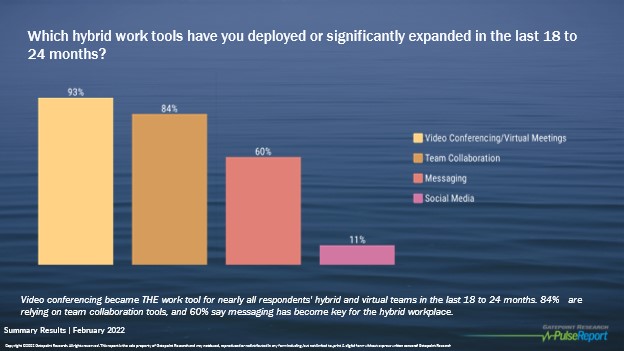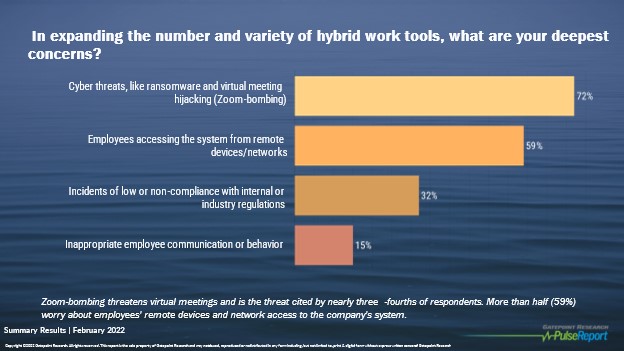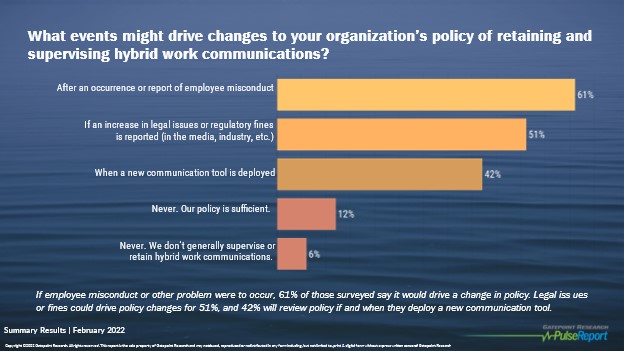Hybrid Work Trends in Financial Services
The adoption of new and different types of communications tools, especially for business use, has been steadily increasing for several years. But the scales tipped dramatically in favor of virtual communications over in-person contact in 2020. It’s possible the “scale” of digital vs. IRL communication wasn’t ever evenly balanced, but the trend to communicate via technology doesn’t seem to be letting up any time soon. In fact, we may need to recalibrate the scale altogether.
Digital communication options are only becoming more diverse, making compliance and legal initiatives for financial organizations more complicated. The expanded surface area of communication is generating more data that must be captured, preserved, secured, and monitored. As more tools to enable remote and hybrid work are introduced, regulated organizations need to ensure they are complying with records retention rules while ensuring seamless business continuity.
Earlier this year, we conducted an executive survey to understand how industry leaders are adapting their businesses to enable hybrid work models and culture. Let's explore some of our key takeaways.
Video and voice are the tip of the iceberg
For many office workers, it’s hard to imagine a workday without a virtual meeting or chat notification. Platforms like Zoom and Slack have done some heavy lifting as proxies for remote and hybrid work — and they’ve done so seamlessly.
When we asked which tools had been deployed or significantly expanded in the last two years, a whopping 93% of respondents said video conferencing/virtual meeting tools, with collaboration tools just behind at 84%.

As email was once the primary method of communication for business, on-demand and feature-rich platforms have taken hold. Communications technology will continue to evolve — driving demand for updated, automated compliance controls.
More digital communication brings more risk
When we asked participants what most concerned them about expanding the number and variety of tools for hybrid work, cybersecurity, legal, and regulatory risk were the predominant answers:
- Nearly three-quarters of respondents (72%) said cybersecurity
- Employees accessing systems from remote devices and networks came in at 59%
- Non-compliance with internal or industry regulations was next, at 32%

These concerns are valid in an industry rife with cautionary tales: Big Bank X fined for use of WhatsApp, Global Bank Y fined for malicious text messages, broker-dealer firm fined for lack of oversight of a rogue broker operating under the alter ego of “Roaring Kitty” on Reddit, etc.
The best defense to these potential issues is a carefully considered risk management strategy.
It’s time to be proactive with compliance, risk and security
Now that more advisors and representatives are working remotely or in a hybrid capacity, FINRA has increased scrutiny on communications with the public. In addition to reviewing firm records, it’s expected that reviews will include representatives’ social media accounts and online forums for potential instances of outside business activities. FINRA also called for firms to create best practices and protocols around video content, including developing procedures for live-streamed public appearances and scripted presentations.
Unfortunately, the reasons for reinforcing cybersecurity, legal, and regulatory controls are predominantly reactive. According to 61% of respondents, the move to update communications retention and supervision policies would come “after an occurrence or report of employee misconduct.” Around half — 51% — said they’d potentially update policies if they saw media/industry reporting on legal issues or regulatory violations.

Just as virtual communications have permanently tipped the scales, so have resulting risks — more communications, on more platforms, and seeming anonymity on virtual channels. Solutions for cyber compliance and risk should be considered proactive, necessary tools for enabling productivity.
Join the discussion with Zoom and Slack
To discuss these hybrid work trends and approaches for compliance and risk management, we talked with Global Deputy CIO at Zoom, Gary Sorrentino, and Lead Financial Services Consultant at Slack, Jerrod Travlee, for a webinar on-demand. They’ll be examining:
- The innovative ways regulated organizations are using video, voice, and IM/collaboration tools to engage with employees and customers
- How to drive proactive change to future-proof communications retention and supervision policies
- The regulatory, legal and financial impacts of outdated supervision policies or infrequent surveillance of communications data on collaboration platforms
- How to address the top concerns with expanding collaboration platform utilization, including cyber risk, remote access, and regulatory non-compliance
Share this post!
Smarsh Blog
Our internal subject matter experts and our network of external industry experts are featured with insights into the technology and industry trends that affect your electronic communications compliance initiatives. Sign up to benefit from their deep understanding, tips and best practices regarding how your company can manage compliance risk while unlocking the business value of your communications data.
Ready to enable compliant productivity?
Join the 6,500+ customers using Smarsh to drive their business forward.





Subscribe to the Smarsh Blog Digest
Subscribe to receive a monthly digest of articles exploring regulatory updates, news, trends and best practices in electronic communications capture and archiving.
Smarsh handles information you submit to Smarsh in accordance with its Privacy Policy. By clicking "submit", you consent to Smarsh processing your information and storing it in accordance with the Privacy Policy and agree to receive communications from Smarsh and its third-party partners regarding products and services that may be of interest to you. You may withdraw your consent at any time by emailing privacy@smarsh.com.
FOLLOW US